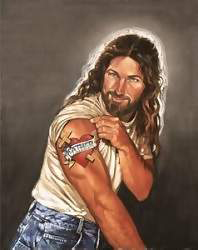
~ Forgiveness, again ~ by Deborah Beach Giordano
Seventy-Seven Times
In this reflection we will continue our examination of the Christ’s call to forgive, “not seven times, but seventy-seven times.” That may seem like a lot of attention to a single topic; but, as we’ve said: that’s a lot of forgiving — and it’s not always easy to do. In fact, sometimes it feels downright impossible.
But we know it is important, because the Lord spoke about it often — and made it the center-point of the prayer He taught his disciples.
We also know that when we do not forgive, our focus on what has happened can prevent us from seeing what is happening. We can become blind to the beauty and possibility of each new day. We are mired in the past.
 Strangely, that very “stuckness” can perpetuate the inability to forgive. As long as those old “tapes” keep running; when the memories arise, over and over — the hurt feels very recent. It keeps us connected to what happened and to the perpetrator. As a friend of mine who has been in recovery for many years puts it, “It is as if he’s living in your head, rent free.”
Strangely, that very “stuckness” can perpetuate the inability to forgive. As long as those old “tapes” keep running; when the memories arise, over and over — the hurt feels very recent. It keeps us connected to what happened and to the perpetrator. As a friend of mine who has been in recovery for many years puts it, “It is as if he’s living in your head, rent free.”
It is only when we forgive that we can be truly free of this unwanted tenant.
Other Options
There are true saints who live among us who can move immediately to forgiveness after they have been hurt by another. Confident that God will take care of the outcome, they release themselves from the harm that has been done and seek only understanding. But for many of us — and certainly in my case — there is a lingering passionate need to see that justice is done.
But what constitutes “justice”? Who decides? How much is “enough”?
That’s the tricky bit. We might think that we know what is “fair and just” — but our judgment may not match what others would decide.

For ages and ages people have sought “justice” in their own way; setting themselves up as arbiters of what will “make things right.” But sometimes — more often than not, I’m afraid — it isn’t justice that is sought, but revenge.
"Getting Even"
We’ve often heard the “wounded party” — the woman who found a scratch on her car in the parking lot, the teenager who felt “dissed” by another student, the man who was laid off from his job — claim the right to “get even.” They plan to “balance the scales” and set things right again. According to their sense of outrage they respond: a key along the side of the offending vehicle, a fistfight after school, a shotgun in the office.
These actions do not constitute justice, but vengeance. They offer no resolution, they bring neither safety nor peace of mind — only more violence, fear, and hate.
Jesus’ call to forgive seventy-seven times is a noteworthy counterpoint to those of Cain’s great-great-great grandson.
“Lamech said to his wives, ‘Adah and Zillah, hear my voice; you wives of Lamech, listen to what I say: I have killed a man for wounding me, a young man for striking me. If Cain is avenged sevenfold, truly Lamech will be avenged seventy-sevenfold.’" ~ Genesis 4:23-24
Thus did the descendant of the first murderer terrorize his own family with the threat of deadly violence in the face of any perceived “insult.” Thus does the cycle of vengeance and violence come down to us this very day.
A Different Path
Christians are called to follow the teachings of our Lord; we are to resist the worldly temptation to destroy, to hurt, to tear down, to “get even.” It is our holy task — our life work and ministry — to follow the Way that Jesus taught; loving God and our neighbors, caring for those in need, being compassionate, forgiving, merciful and generous.
It’s a completely counter-cultural way of living.
 Everywhere we look, we see “the mark of Cain” — the destruction and despair wreaked by those who have “avenged” themselves; who have set themselves above God: acting as judge, jury, and executioner.
Everywhere we look, we see “the mark of Cain” — the destruction and despair wreaked by those who have “avenged” themselves; who have set themselves above God: acting as judge, jury, and executioner.
The cycle of vengeance and violence, revenge and retaliation has stained every town, every city, every nation, every family. All around us are sorrows, scars, bloodstains, and graves. And the people are crying out for salvation.
Never has the need for Christ’s healing, hopeful, saving message been greater. Never has the need for forgiveness, compassion, generosity — the love of God and love of neighbor — been greater.
A Holy Work
Forgiving others is not merely “good advice” — Jesus’ teachings are more than just helpful hints for our improved mental health.
“The way of the world” must change, and we must bring that change into being.
The belief in seventy-sevenfold revenge and retaliation has led to seventy-sevenfold slaughter, seventy-sevenfold heartbreak, seventy-sevenfold destruction. The salvation of the world depends on seventy-sevenfold forgiveness, patience, understanding, and compassion.

Christ came to establish the Kingdom of Heaven — not in some distant by-and-by, but in the here and now. We have been called to continue His work: that peace may reign, the hungry fed, the sorrowing comforted, the sick healed, the radiant Good News revealed to those who live in darkness, despair, and fear.
Now I know that some folks, upon hearing that proclamation, will sneer: “Right. And the lion will lie down with the lamb, and leopards will eat lawn clippings!”
Hard work, Persistence, and Faith
No one said that following Christ was easy. (Or, if they did, they shouldn’t have!)
Just because it is hard to do, doesn’t mean it is impossible. Our Lord did not call His disciples to a work that cannot be accomplished.
Just because we don’t see immediate transformation doesn’t mean it isn’t happening.
People’s hearts change first: only later do their thoughts and actions follow. And they won’t even know there is an alternative to vengeance and violence unless we show them there is Another Way. True Christian witness is not standing on street corners (or in pulpits!) telling people what to do — it is revealed by the living of our lives.
Change Happens
When we forgive others, when we offer understanding to those who have “fallen short of the glory of God” (and who among us hasn’t?), when we face the world with kindness, compassion, and generosity ... things will change.
The first thing to change will be ourselves: our spirits will be lighter, our hearts gentler, our minds calm. Wherever we are becomes a sanctuary: a place of peace and tranquility, a temple dedicated to the Living God.
We will no longer look for ways to “get even” — but for ways to help and to heal. We will be at work, building the Kingdom our Lord proclaimed; right here in our midst (Luke 17:21).
As soon as we change, the world changes. When we trust in God’s justice, we will not seek to “avenge” our hurts. When our hearts are at peace, there is one less “fuse” that could spark a violent outburst. When we are merciful and forgiving, there is less fuel for the hellish fire of revenge and retaliation.

When our souls are “at rest in God,” others will take note. They may wonder what causes us to be the kind of people we are; they may want to share in the Life we have found. They may come to believe that there really is something to this Jesus fellow, and to the Gospel He proclaimed.
Virtual hugs and real-time blessings,
Deborah +
This Week's Spiritual Exercise
How often do you — and others — claim that slights, insults, and injuries (real or imagined) are a “justification” for retaliation?